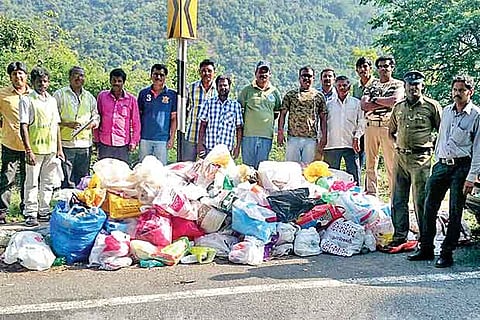

Wildlife activists and officials of the Reserve Forest (RF) covering the hill station say thoughtless littering by public is turning into huge problem not only to the environment, but also detrimental to the wildlife.
According to reliable sources, Udhagamandalam is averaging 50,000 tourists a day and the number is expected to go up in the coming days as the holiday season kicks in. The once quiet, summer retreat is seeing close to 10,000 vehicles, ranging from two-wheelers to buses. Civic workers are collecting 40 to 45 tonne of plastic items per week during summer season, as against the 15 to 20 tonnes during the rest of the year. Last year, this time of the year saw an average of 35 tonnes per week.
B Ramakrishnan, Assistant Professor, Department of Zoology and Wildlife Biology, Government Arts College, Udhagamandalam told DT Next, “Usage of plastics in the RFs are wide-ranging and long lasting. Plastic will stifle the root of plants, resulting in its wilting. Plastic waste clogs drains in the town and chokes the ground in forest areas. The green cover will go down faster than is normal,” he warned.
There was a time when people used to take photographs of signage that said, “Welcome to plastic-free Nilgris.” Not anymore! Vijay Krishnaraj, a wildlife activist and former secretary, Nilgiris Wildlife Association says “It is a plain fact that despite caution boards and waste bins, people are scattering plastic items like water sachets and carry bags in some bushes, endangering animals that forage for food.” He says awareness campaigns are not having the desired effect, and called for stricter measures.
When DT Next contacted, Dr P Shankar, District Collector, Nilgiris, he said that the district has been receiving around 50,000 visitors. “We are continuously monitoring usage of plastic and sometimes we impose fine on people carrying plastic items. Though it is a Himalayan task for us, a score of NonGovernmental Organisations (NGOs) in conjunction with district conservancy workers are being pressed into action to clean the waste, particularly the plastic items,” he said.
According to him they also conduct weekly mass cleaning programmes and put up caution boards in the RFs and other areas on plastic usage. But the hills continue to be subjected to man-made degradation.
Visit news.dtnext.in to explore our interactive epaper!
Download the DT Next app for more exciting features!
Click here for iOS
Click here for Android